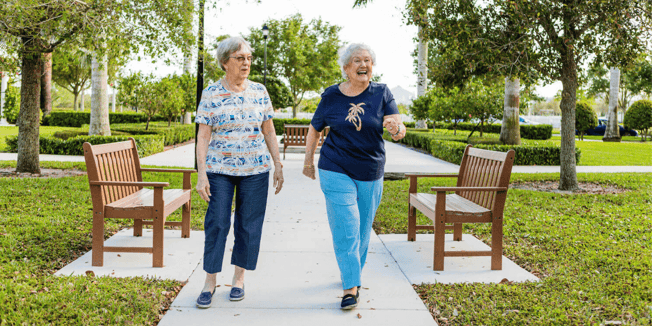Debunked: 8 Myths About Senior Living Communities
Listen to this article

Almost 9 in 10 Americans over the age of 65 say they want to remain in their current homes as they age. This should come as no surprise to anyone who has heard any of the many misconceptions about senior living communities that pervade our culture.
Perhaps you believe some of these stereotypes yourself. Maybe you think that senior living is only for very old or very sick people, that it’s a euphemism for a nursing home, or that people only choose senior living communities because they “have to.” These myths are deeply rooted in ageist notions about what it means to get older, what a good life looks like, and the value of aging.
Thoughtful senior living communities know that age brings wisdom and generativity, and that these gifts of age should be honored. Instead of running from the benefits of aging and maturity, high-quality independent living communities embrace it, helping your loved one build a life of their choosing. The result is something categorically different than the stereotypes might have you believe.
The right independent living community can improve lives, relieve stress, and help cultivate deeper, lasting relationships. It can even support your loved one’s health goals so they can live a longer, healthier life. And, it can relieve some of the stress adult children experience as they support aging parents.
Here’s why these top eight independent senior living misconceptions are wrong—and how they might prevent seniors from living their best life.
1. Independent Living Is Only for Sick, Old People
It’s true that independent living communities cater to people in the second half of life, but that means something vastly different than what you might assume. Most people chose senior living because it offers a more vibrant and active lifestyle than they get living alone in a house. They want richer, deeper connections, more meaningful activities, and a chance to explore the world without worrying about leaving their homes behind.
Anyone over the age of 55 can move to senior living. In fact, many healthy, independent adults make the move because they want the quality of life they can only get in a vibrant community setting. They understand that the right independent living community can preserve their health and help them feel younger, longer.
Even if your loved one is ill or has chronic medical issues, an independent living community is not a nursing home. The focus of senior living is on the overall quality of life, not just managing disease. Your loved one will gain access to services that prioritize emotional and physical wellness, so they can stay independent and healthy as long as possible.
2. My Loved One Will Be Bored
Many of our residents choose to move to a senior living community because they feel bored living alone. They’re tired of trying to plan every day, and they’ve realized that filling the week with events can be expensive and time-consuming. Many who move to our independent living communities marvel that they didn’t do it sooner.
The myth of boredom in senior living prevents people from enjoying all it has to offer. It stokes the anxieties of people who already feel bored at home and worry that whatever lies ahead is much worse.
In independent living, your loved one can enjoy all of the activities they enjoyed at home without having to worry about cleaning, cooking, grocery shopping, landscaping, and other stressors. They’ll also gain access to a wide variety of programs that nurture their friendships, help them continue to learn, and offer a sense of vitality and adventure. They will enjoy restaurant-style dining, fun events, and continuing education classes every day for the rest of their life, if they want.
3. I’m Abandoning My Loved One
Even if your parent is in exceptionally good health, watching them grow older can be disorienting. You may worry about how you might one day care for the parent who has always cared for you. And if you’re like most children of aging parents, you might find this role shift a bit uncomfortable.
Many adult children hope that, should their parent ever need them, they’ll be able to care for them. That’s a laudable goal. The reality, though, is that your parent may not want you to care for them. Many aging adults fear being a “burden” to their children. Others relish their privacy, and do not want their adult children to micromanage their lives.
Encouraging your loved one to move to independent living is not abandonment. It’s empowerment. It allows your loved one to live life on their own terms, to get support if they ever need it, and to continue being the parent you’ve always known without feeling like they have to rely on you for help.
There’s something else to consider here, too: A good parent wants their child to live their best life. Your parent likely has dreams for your future that include lots of joy, enough rest, and time for yourself. Caring for an aging parent can be exhausting, and caregiver burnout can affect your health and well-being. Burnout is bad for you. It undermines your ability to support your parent—and it’s likely not something your parent wants for you, either.
Ask your parent what they want. What does their ideal next chapter involve? What role do they envision for you? And then believe their answer if they say that independent living is the best move for them.
4. Staying Home Is Better for My Parent
Staying home is only better for your parent if that’s what they want, and if all of their needs are met at home. But aging can be tough (and annoying). Plus, retirement doesn’t always live up to expectations, especially if your loved one lives alone or feels tired of chores, cooking, and finding social activities.
The right independent living community enlivens your loved one’s spirits. It gives them a chance to pal around with friends old and new in a welcoming community where the food is great, the activities are plentiful, and the staff is attentive.
Don’t make assumptions about what’s best for your loved one, how they’d prefer to spend their time, or where they might want to live. Ask them about their priorities, then consider whether the right community might be the best option for meeting their needs.
Not sure which lifestyle option is right for you? Learn about your options and get personalized results in about 4 minutes.
Take the Assessment5. My Loved One Can’t Leave
People choose independent living not just once, on move-in day, but day after day, week after week, year after year. An independent living community is just another type of home. It’s not jail or a hospital, and your loved one is neither trapped nor forced. They can still go where they want, when they want.
In fact, many independent living residents say that the right community actually makes it much easier to come and go as they please. Your loved one will no longer have to hire a house sitter when they travel abroad or rush back from vacation to tend to their lawn. When your loved one chooses senior living, they can leave when they want and then, when it fits their schedule and desires, return to our welcoming community where their presence is always missed.
But what if your loved one has certain medical needs? Senior living is an ideal option for preserving their independence and freedom of movement, too. For instance, Cedarhurst Senior Living’s programs keep your loved one active, eating well, and living an enriching life, so they can remain in good health. And that might mean more vacations, more trips to see family, and more excursions to their favorite neighborhood restaurant.
6. The Food Is Bad
At Cedarhurst Senior Living communities, your loved one can still indulge in their favorite comfort foods, seasonal favorites, and treats while enjoying a menu tailored to their health and nutritional goals.
Food is a major predictor of health, and high-quality senior living communities are all about optimizing long-term health while helping your loved one savor the present moment. This means they’ll enjoy nourishing meals that taste delicious without all of the stress involved in meal planning, shopping, and cooking. Many residents tell us that they relish the chance to spend the time they used to devote to cooking on something else.
Some of the highlights of Cedarhurst’s dining program, Crafted by Cedarhurst℠, include:
- A variety of beautiful dining settings: Your loved one can eat in a restaurant-style dining space or enjoy takeout in the comfort of their own home.
- Customizable dining options: We love making custom meals and family favorites for our residents.
- A variety of foods at every meal: At Cedarhurst, we craft a mix of fresh, seasonally inspired flavors and perennially available comfort foods. There are no one-size-fits-all food plans, and residents can eat something different each and every day if they desire.
- Custom menus for various health needs: We cater to your loved one’s dietary needs with our special menu items, including options that are diabetic-friendly, low-sodium, heart-healthy, gluten-free, and that help Boost Your Brain℠.
7. My Loved One Will Lose Independence
The move to an independent living community is a choice. Most of our residents say that the transition to senior living actually increases their independence. That’s because the focus on holistic health and wellness can improve longevity, help them feel better and healthier, and reduce their need to rely on others for support.
People who move to independent living find that they no longer have to worry about housekeeping and other daily chores. That means less stress and fewer responsibilities, which in turn can bolster your loved one’s independence.
But what if they have serious medical conditions? Even then, they don’t have to give up their independence, and moving to senior living can mean more autonomy. They will no longer have to exclusively rely on loved ones for help and support. This, too, can restore a greater sense of independence.
8. It’s Too Expensive
If you know the benefits of senior living, you might have fallen prey to another harmful stereotype: It’s way out of your price range. The reality is that senior living rolls all of your loved one’s expenses into a single monthly bill. In return, they will enjoy incredible value, more amenities than your loved one can get at home, and an exceptional quality of life.
Cedarhurst: Dispelling Misconceptions About Senior Living
Cedarhurst is on a mission to end stereotypes about senior living by offering communities that revolutionize the continuum of senior living options. We’d love to show you what we’re all about.
It’s never too early to start thinking about senior living. In fact, many residents say they wish they had moved much sooner. Learn how to get started.
Originally published November 2022. Revised November 2023.






.png?width=307&height=200&name=Blog%20%2333%201400%20x%20700%20(1).png)

.png?width=307&height=200&name=Blog%20%2332%201400%20x%20700%20(8).png)



